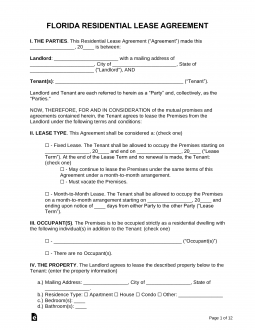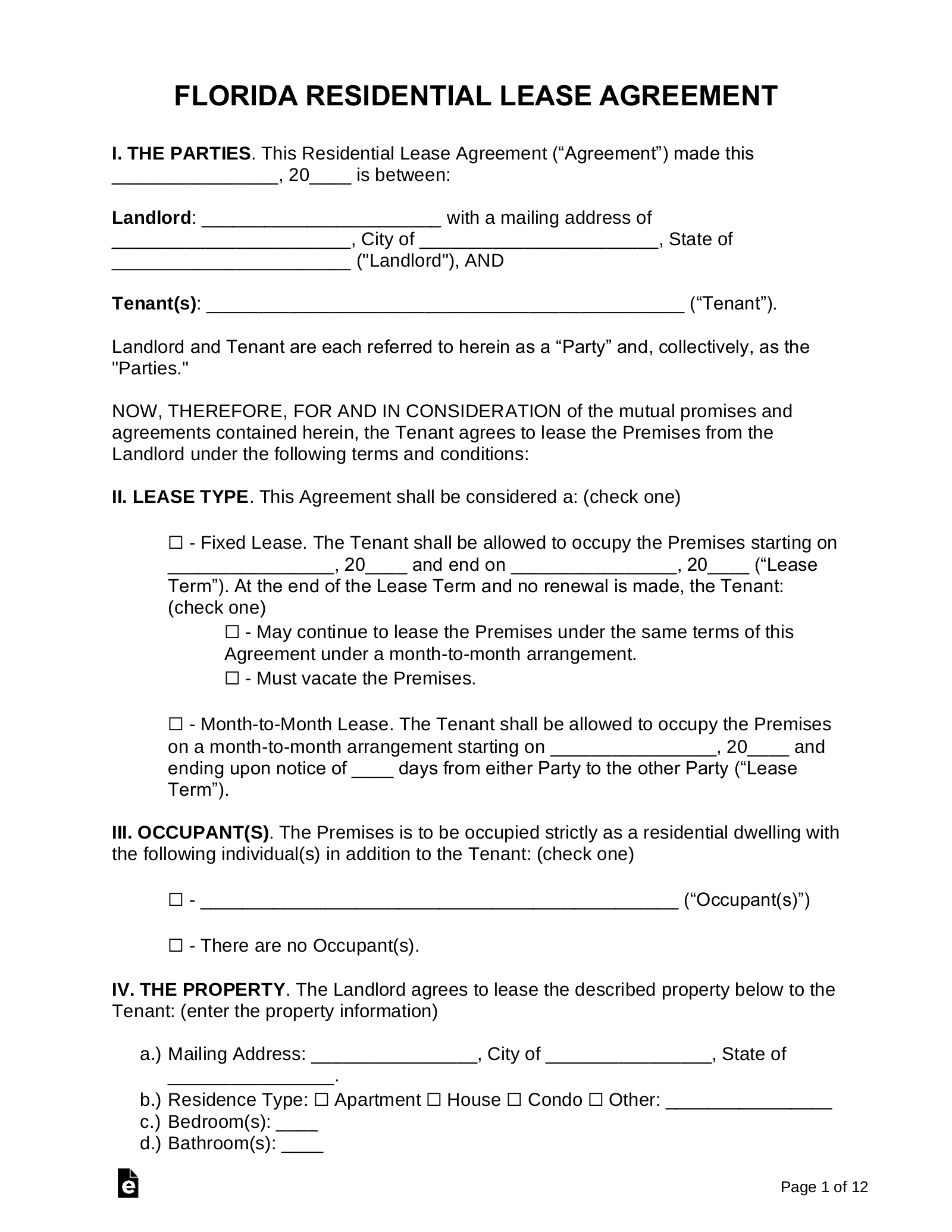Updated November 20, 2023
A Florida lease agreement is a document written between a landlord and tenant for the renting of commercial or residential property. The agreement is written after the landlord has accepted a rental application by the tenant that details their personal information and gives their consent to run a credit report. At lease signing, the tenant must pay the first month’s rent and a security deposit (if any).
Table of Contents |
Agreement Types (9)
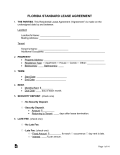 Standard Residential Agreement – The most common type of rental contract that allows the landlord and tenant to come to a binding arrangement for the property. Standard Residential Agreement – The most common type of rental contract that allows the landlord and tenant to come to a binding arrangement for the property.
Download: PDF, MS Word, OpenDocument |
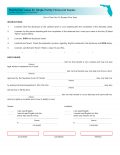 Association of Realtors Agreement – Standard residential agreement approved by the Florida Association of Realtors. Association of Realtors Agreement – Standard residential agreement approved by the Florida Association of Realtors.
Download: PDF |
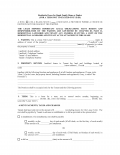
BAR Association Lease Agreement – Produced by the Florida BAR for use by landlords. Download: PDF |
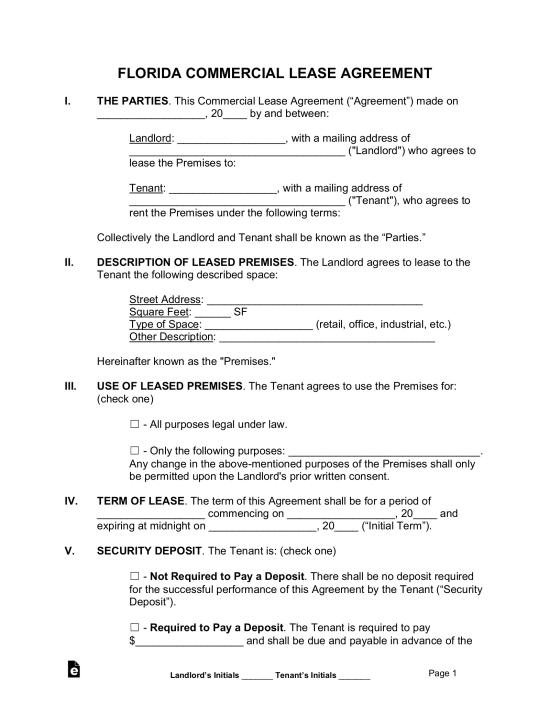 Commercial Lease Agreement – For any business-oriented use that may be for any type of retail, office, or industrial space. Commercial Lease Agreement – For any business-oriented use that may be for any type of retail, office, or industrial space.
Download: PDF, MS Word, OpenDocument |
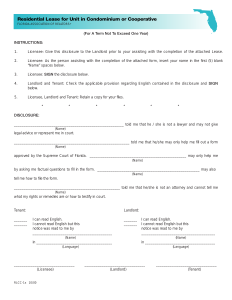 Condominium Lease Agreement – For any type of condo or cooperative unit for a period of a maximum of one year. Condominium Lease Agreement – For any type of condo or cooperative unit for a period of a maximum of one year.
Download: PDF |
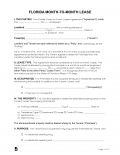 Month-to-Month Rental Agreement – Short-term lease that can be terminated with 15 days’ notice. Month-to-Month Rental Agreement – Short-term lease that can be terminated with 15 days’ notice.
Download: PDF, MS Word, OpenDocument |
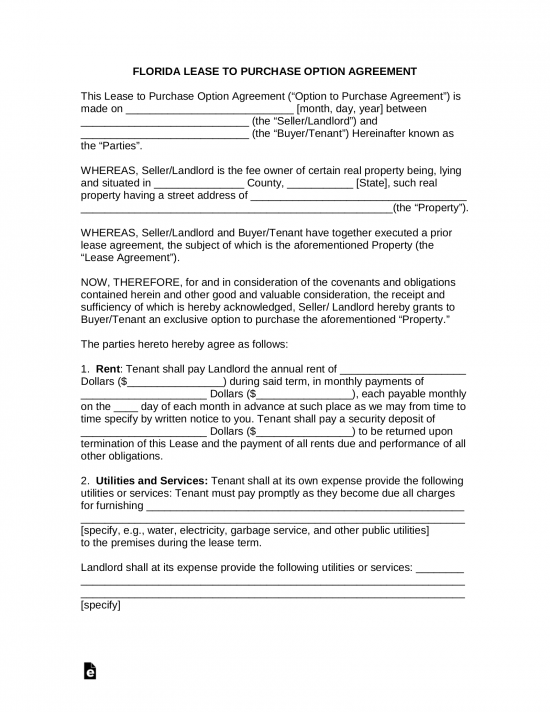 Rent-to-Own Lease Agreement – Standard form with the benefit of having an option to purchase the property. Rent-to-Own Lease Agreement – Standard form with the benefit of having an option to purchase the property.
Download: PDF, MS Word, OpenDocument |
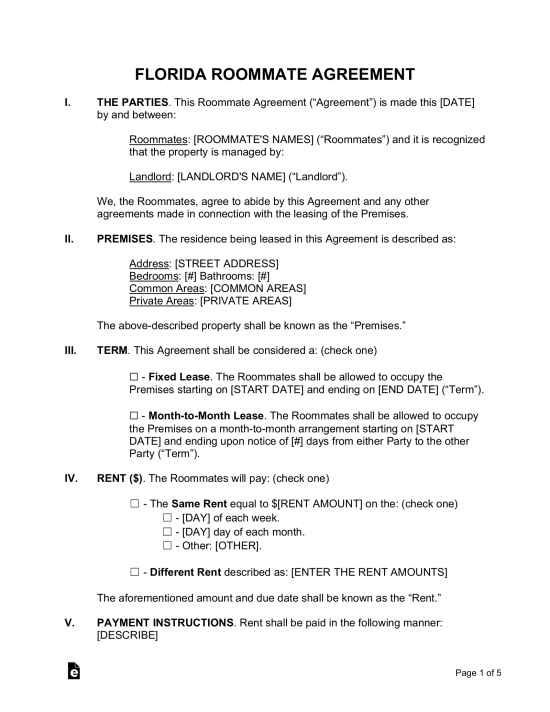 Roommate (Room Rental) Agreement – Between the tenants of a shared living situation. Roommate (Room Rental) Agreement – Between the tenants of a shared living situation.
Download: PDF, MS Word, OpenDocument |
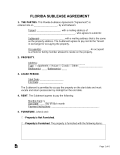 Sublease Agreement – The act of renting space that is under lease from another tenant. The new tenant is known as the subtenant or sublessee. Typically, the landlord must consent to this type of tenancy. Sublease Agreement – The act of renting space that is under lease from another tenant. The new tenant is known as the subtenant or sublessee. Typically, the landlord must consent to this type of tenancy.
Download: PDF, MS Word, OpenDocument |
Required Disclosures (4)
1. Identification – The lease must include the name and contact information of the landlord or other point of contact for the lease.[1]
2. Lead-Based Paint Disclosure – Federal law requires landlords to complete and provide to a tenant prior to occupancy.
3. Radon Disclosure – The following must be stated in every Florida lease agreement:[2]
RADON GAS: Radon is a naturally occurring radioactive gas that, when it has accumulated in a building in sufficient quantities, may present health risks to persons who are exposed to it over time. Levels of radon that exceed federal and state guidelines have been found in buildings in Florida. Additional information regarding radon and radon testing may be obtained from your county health department.
4. Security Deposit Disclosure (conditional) – If there is a security deposit, the following must be included or attached to the lease (notice written in CAPITAL LETTERS along with the Security Deposit Receipt):[3]
YOUR LEASE REQUIRES PAYMENT OF CERTAIN DEPOSITS. THE LANDLORD MAY TRANSFER ADVANCE RENTS TO THE LANDLORD’S ACCOUNT AS THEY ARE DUE AND WITHOUT NOTICE. WHEN YOU MOVE OUT, YOU MUST GIVE THE LANDLORD YOUR NEW ADDRESS SO THAT THE LANDLORD CAN SEND YOU NOTICES REGARDING YOUR DEPOSIT. THE LANDLORD MUST MAIL YOU NOTICE, WITHIN 30 DAYS AFTER YOU MOVE OUT, OF THE LANDLORD’S INTENT TO IMPOSE A CLAIM AGAINST THE DEPOSIT. IF YOU DO NOT REPLY TO THE LANDLORD STATING YOUR OBJECTION TO THE CLAIM WITHIN 15 DAYS AFTER RECEIPT OF THE LANDLORD’S NOTICE, THE LANDLORD WILL COLLECT THE CLAIM AND MUST MAIL YOU THE REMAINING DEPOSIT, IF ANY. IF THE LANDLORD FAILS TO TIMELY MAIL YOU NOTICE, THE LANDLORD MUST RETURN THE DEPOSIT BUT MAY LATER FILE A LAWSUIT AGAINST YOU FOR DAMAGES. IF YOU FAIL TO TIMELY OBJECT TO A CLAIM, THE LANDLORD MAY COLLECT FROM THE DEPOSIT, BUT YOU MAY LATER FILE A LAWSUIT CLAIMING A REFUND. YOU SHOULD ATTEMPT TO INFORMALLY RESOLVE ANY DISPUTE BEFORE FILING A LAWSUIT. GENERALLY, THE PARTY IN WHOSE FAVOR A JUDGMENT IS RENDERED WILL BE AWARDED COSTS AND ATTORNEY FEES PAYABLE BY THE LOSING PARTY. THIS DISCLOSURE IS BASIC. PLEASE REFER TO PART II OF CHAPTER 83, FLORIDA STATUTES, TO DETERMINE YOUR LEGAL RIGHTS AND OBLIGATIONS.
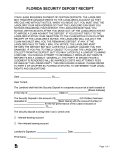 Security Deposit Receipt – After the tenant has paid a security deposit, the landlord must notify them within 30 days of where the money is being held and if it is an interest or non-interest-bearing account.
Security Deposit Receipt – After the tenant has paid a security deposit, the landlord must notify them within 30 days of where the money is being held and if it is an interest or non-interest-bearing account.
Download: PDF, MS Word, OpenDocument
Security Deposits
Maximum Amount – Florida law does not impose a maximum amount on security deposits.
Separate Bank Account – Security deposits must be held in a separate bank account or surety bond. Any interest generated on the deposit must be paid to the tenant.[4]
Receipt – The landlord must provide notice within 30 days of payment where the deposit is being held and if it will generate interest.[5]
Returning to Tenant – At the end of the lease, the deposit is due back to the tenant within 15 days if there are no deductions and 30 days if there are deductions.[6]
When is Rent Due?
Grace Period – Rent is due in Florida on the day mentioned in the lease agreement. This is commonly the first day of the month. There is no rent grace period.[7] If rent is late, the tenant can be issued a 3-day notice to quit to begin the eviction process.
Maximum Late Fee – A late fee is permitted that is not “unconscionable.” Any late fees charged by the landlord should be mentioned in the lease.[8]
NSF Fee – The maximum allowable NSF fees are as follows:
- $25 if the check is $50 or less;
- $30 if the check is $300 or less;
- $40 if the check is $800 or less;
- 5% if the check is greater than $800.[9]
Withholding Rent – The tenant may be able to withhold rent if the landlord is not in compliance with the rental agreement or the law. If the tenant intends to withhold rent, they must provide seven days’ written notice.[10]
Right to Enter (Landlord)
Standard Access – The landlord may access the property of the tenant by providing “reasonable notice,” which is deemed to be at least 12 hours before entering. The landlord may only enter during “reasonable times,” 7:30 a.m. to 8:00 p.m.[11]
Immediate Access – The landlord may enter without notice under any of the following circumstances:
- Consent by the tenant;
- In the event of an emergency;
- When the tenant unreasonably withholds consent; or
- The tenant is absent from the property for half of the timeframe for periodic payments.
It is against Florida law for the tenant to abuse this right of access as a way to harass the tenant.[12]
Abandonment
Absence – If the tenant has been absent for length of time equal to one-half the rental payment period, and rent is late or the tenant has not notified the landlord in writing of the absence, the dwelling is presumed abandoned.[13]
Breaking the Lease – If the tenant surrenders the property before the lease is up, they remain liable for paying rent.[14] Alternatively, if specified in the rental agreement, the landlord may charge an early termination fee or liquidated damages not exceeding 2 months’ rent.[15]
Tenant’s Utility Shutoff – There is no statute regarding a tenant’s obligation to maintain utilities. However, the tenant must use the property in a reasonable manner and comply with all relevant health and safety codes.[16]
Unclaimed Property – The landlord must notify the tenant in writing of any property left behind after the end of the lease. The notice should specify storage costs, the location where the property can be claimed, and the date by which it must be claimed (10 days after personal delivery of the notice or 15 days if delivered by mail).[17]
If the property is not claimed and the value is over $500, it must be sold at a public sale by competitive bidding. The proceeds, minus costs of storage and advertising, must be paid into the county treasury.[18]

